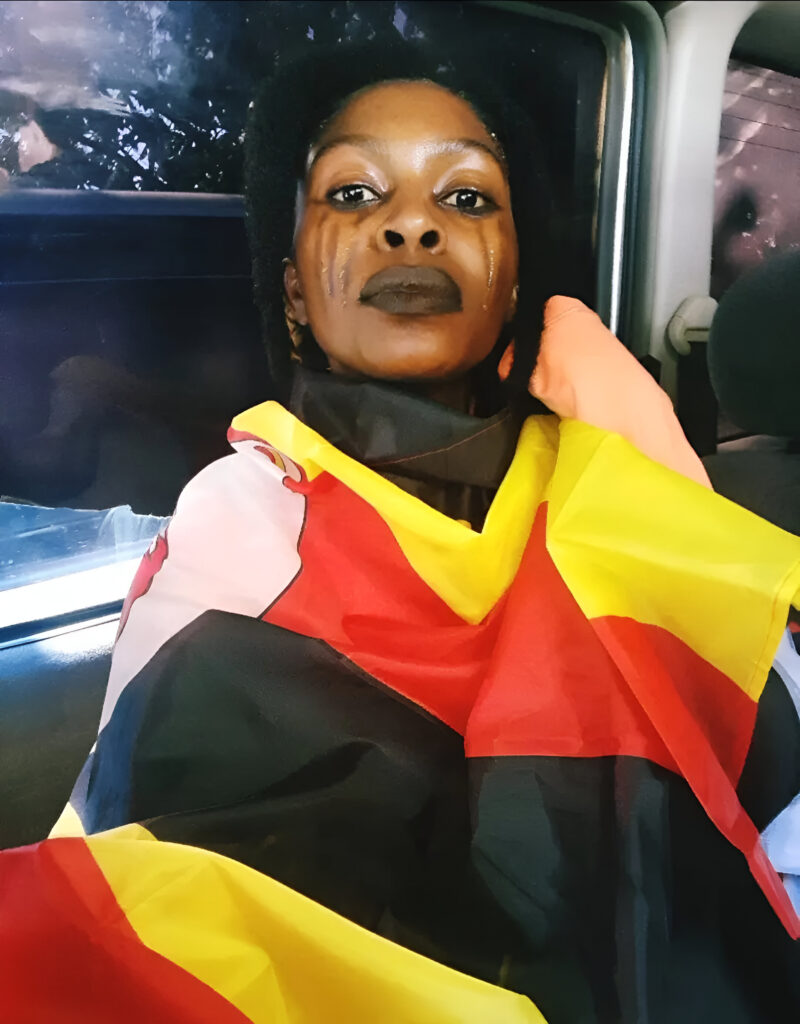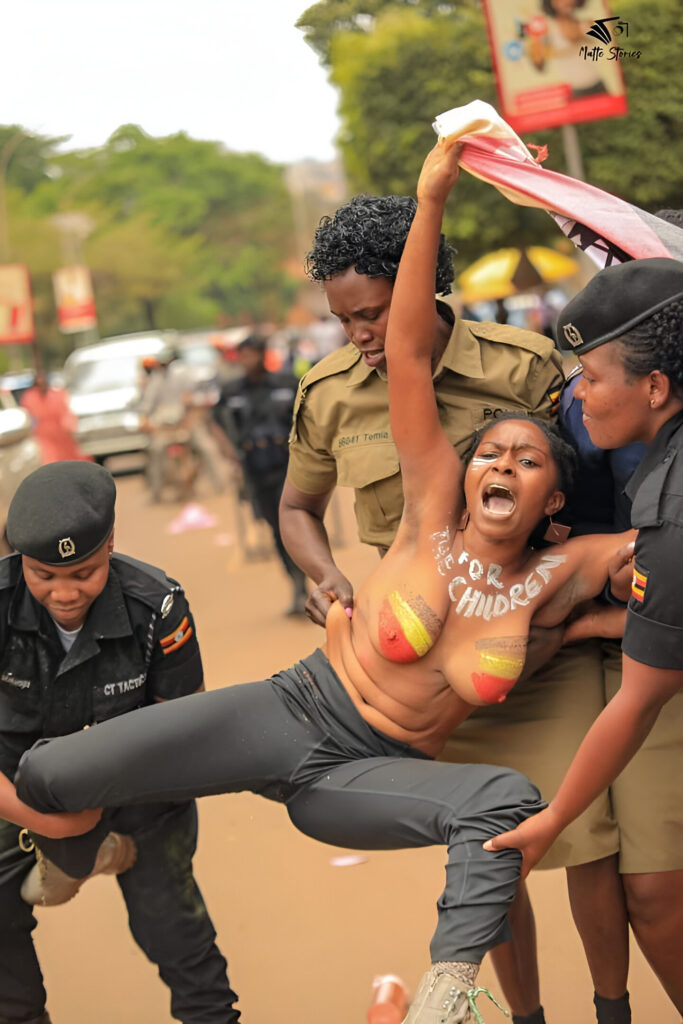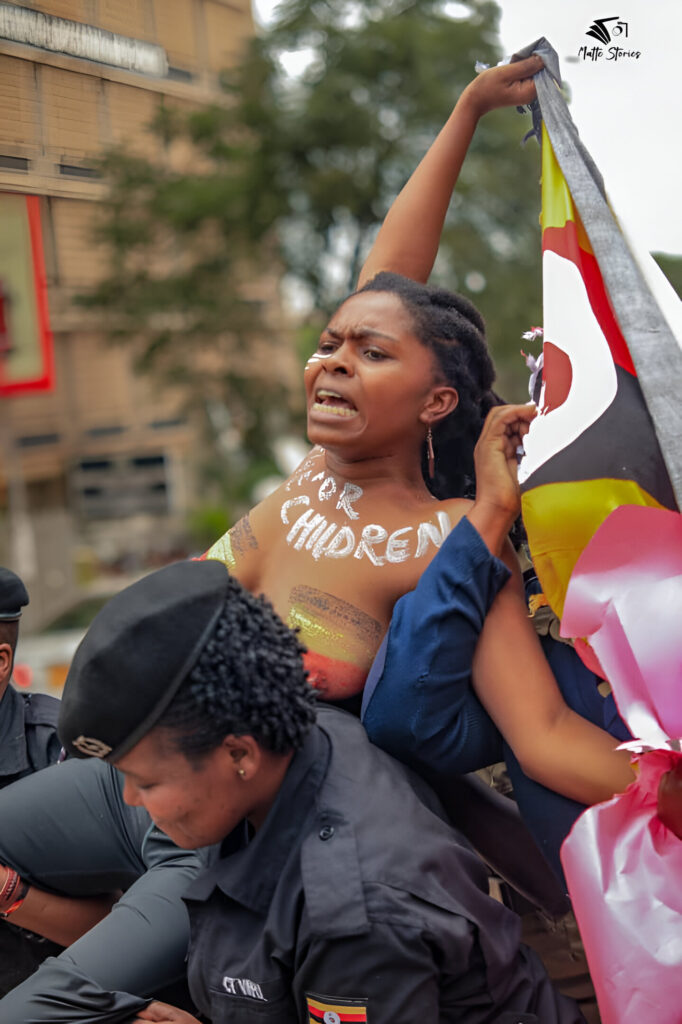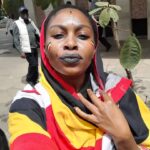Minds of the Movement
An ICNC blog on the people and power of civil resistance
by Kemitooma K. Nyina'NkyenziboNovember 04, 2025
The Ugandan state branded it a ‘common nuisance,’ but this nude protest, echoing the 1929 Nigerian Women’s War, wielded cultural defiance to expose forty years of authoritarianism under Yoweri Museveni. It was the language spoken by tired citizens. The language of the unheard. It was a radical act by three young women, slapping decades of injustice and shame onto the walls of the Ugandan parliament. It was a cursing ceremony to say, enough is enough. And although the regime's propagandists spat in our faces and declared our radical assembly a nuisance, the oppressed and suppressed Ugandans embraced and crowned us heroines, clad in the armor of nudity to shed naked light on the rot that our government has become.

There was pressure, especially from Ugandans in the diaspora. The time had come for fundamental change not only in Kenya but across Africa. If Kenyan youths could humiliate their state as they did during the Gen-Z uprising, Ugandan young people only had to replicate it. It sounded crazy to think that the revolutionary spirit burning in Kenya in 2024 could ignite here too. Was Uganda ready for fundamental change?
I knew heading back home was suicidal, but I went without much thought. The dull air at Entebbe Airport should have warned me of the coldness ahead. Why were campaign posters of the president still plastered across every wall three years after a bloody election? What more abnormal normalcy had crept into the collective DNA of Ugandans? What more signs of political indifference and complacency was I to expect?
After meeting my 'hold-your-coat merchant' comrade, we spent the first weeks in the ghettos of Kampala city. Among the masses, the air was thick with talk of elections and corruption. On July 23rd, 2024, youths poured into the streets to protest corruption and injustice. The regime responded brutally with mass arrests, tear gas, and intimidation. Those arrested were remanded to Luzira Maximum Security Prison.
Turning Anger into Resistance
Anger among the masses, when channeled like our prison-planned protest, is a powerful weapon for nonviolent uprisings, building coalitions that sustain momentum. The dictatorship had beaten and humiliated us, and our anger was justified. But anger alone is fleeting.

Kemitooma, along with other women was brutally arrested during the nude protest. Kampala, 2024. Credit: Matte Derrick.
One morning in the Luzira Prison compound, over porridge, an idea struck: radical rudeness. We would be as rude as the corrupt, shameless as those who steal from the poor. We vowed to deploy our last feminine weapon: “amabere namabina” [breasts and buttocks]. Defeat often fuels creative escalation. Like South Africa’s anti-pass protests, our shift to nudity showed how movements adapt cultural tools to challenge power nonviolently.
After our release, only a few women returned to plan the next action; they were afraid. We held our first meetings at a salon owned by one of our comrades. The government soon learned of our meetings at the salon and shut it down within a week. We began to be more discreet with our plans and meeting venues.
Reclaiming Power Through Our Naked Bodies
In African traditional society, older mothers led cursing ceremonies. When Wangari Maathai and Kenyan women disrobed in protest against the Moi dictatorship, police fled in shame, fearing the curse the women, old enough to be their mothers, would invoke. Our context was different. We were young women determined to change history. In a comrade’s small bedsitter in Makerere’s Kikoni neighborhood, we painted our bodies with fierce love, defiance, and grace. Trusting each other enough to strip became an act of solidarity, a magical moment of reclaiming our feminine power, reclaiming our bodies from shame. We joked, laughed, and cried together.
Shame, and the Price of Defiance

Defiant and unarmed, Kemitooma and her comrades were violently dragged by police during the nude protest. Kampala, 2024. Credit: Matte Derrick
Naked and unafraid, we marched to the streets, and there, the state’s propaganda machine attacked viciously. They said our breasts and bodies were malnourished, frail, and ugly. They labeled us she-devils from hell, sent to destroy Uganda’s peace. But how do you shame the shameless? We had set out to expose the rot within power, to mirror the moral nakedness of our leaders. Instead, the regime called us a “common nuisance.”
They thought our humiliation would silence us; instead, it exposed the government’s fear of women who dared to confront power using the language of culture and the body. They tried to objectify and shame us, the same way they tried to humiliate Dr. Stella Nyanzi, who, in 2016, stripped naked at Makerere University to protest corruption and sexual harassment within the institution. Like Dr. Stella Nyanzi, we weaponized our bodies to denounce government rot, transforming shame into a political language of defiance. Our act of radical rudeness stood as a warning to those who believe that women’s bodies can be policed into silence.
Lessons from the nude protest
- Culture is a weapon of resistance. When the tools of protest are criminalized, reclaiming cultural practices like disrobing as a form of cursing can expose hypocrisy and awaken collective memory.
- Anger must be organized. Raw anger is powerful but unsustainable. Channeling it into structured, strategic acts like our planned protest turns emotion into collective energy.
- The body as a political site. For women, especially under patriarchal regimes, the body is often controlled and silenced. By reclaiming it publicly, we turned the tool of oppression into an instrument of liberation.
- Shame can be transformed into power. The state tried to shame us, but our defiance redefined shame itself. What they saw as indecency became a mirror of their own corruption.
- Solidarity sustains courage. Trusting each other, painting each other’s bodies, and standing together naked before power reminded us that sisterhood is both emotional armor and strategic strength.
Assata Shakur once wrote, “Being a warrior and a struggler has been forced on me by oppression; otherwise, I would have loved to be so much more.” Our nudity was both forced and fierce, a rebellion born from oppression. We bore the weight of shame, the sting of insults, and yet we walked tall. In prison, among women who knew injustice intimately, we were celebrated as heroines. The Museveni government declared us a common nuisance, but the Ugandan people saw us differently, as women who dared to resist and confront centuries of imposed shame, turning taboo into political language. Naked. Beautiful. Brave. The resistance lives on.

Kemitooma K. Nyina’Nkyenzibo
Kemitooma is a 28-year-old Afro-feminist activist and writer exiled for organizing against Uganda’s four-decade dictatorship. She builds grassroots power through feminist organizing and radical resistance, linking Uganda’s struggle for democracy with global movements for justice and liberation.
Read More